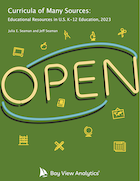Press Release:
Teachers Increasingly Use Digital and Self-Created Materials in Their Classrooms
Download Report: Curricula of Many Sources: Educational Resources in U.S. K-12 Education, 2023
Growing awareness of open educational resources mirrors shift in teachers’ materials preferences
OAKLAND, CA, USA, September 6, 2023/EINPresswire.com/ -- More than three quarters (77%) of K-12 teachers create their own classroom materials to supplement or replace a textbook, and among those who do use a textbook, the same percentage (77%) offer it to their students in digital format, according to the results of an annual survey of K-12 educators conducted by Bay View Analytics. This gravitation toward self-created and digital materials is complemented by an increasing awareness of open educational resources (OER), which are free to use, edit and share. More than one in four (28%) teachers are now aware of OER and Creative Commons licensing—an uptick of six percentage points compared to the 2021-22 school year.“The popularity of digital and self-created materials underscores how much teachers value flexibility and customizability in their instructional materials,” said Julia Seaman, who led the study for Bay View Analytics. “Because OER can be easily customized and shared, it’s possible we’ll see both awareness and use of OER spread among K-12 educators in the future.”
Other key findings from the survey include:
• Textbooks remain a fixture in classroom instruction, as 72% of teachers say they require a textbook in their classrooms.
• Over half of teachers agree that “they prefer print materials over digital for teaching” (57%), and that “students learn better from print materials than they do from digital” (59%). Half of teachers agree that “students prefer print over digital” (50%).
• Many teachers use digital tools in their classrooms on a daily basis. The most commonly used student-facing tools are laptops and tablets, and the most commonly used teacher-facing tools are digital grading and attendance tools.
• While slightly more than half of teachers (51%) give their curriculum a grade of an A or B, only a third of teachers (33%) give their professional development similarly high marks.
These results are part of an annual survey of educators conducted by Bay View Analytics, tracking curricula adoption decisions in K-12 in the U.S. The project is supported by the William and Flora Hewlett Foundation and Online Learning Consortium. The complete report, Curricula of Many Sources, has been released under a Creative Commons license and is available for download at https://www.bayviewanalytics.com/reports/curricula-of-many-sources-2023.pdf. The full series of reports for this project and for reports on higher education are available on the OER section of the Bay View Analytics webpage, https://www.bayviewanalytics.com/oer.html.
About Bay View Analytics
Bay View Analytics is a statistical research firm focusing on survey design, implementation and analysis. The scope of Bay View Analytics' consulting engagements includes scientific statistical analyses, clinical trial statistics and survey designs for a range of topics, with a particular focus on online education. Bay View Analytics has been conducting research and publishing annual reports on the state of online education in U.S. higher education for thirteen years. Visit www.bayviewanalytics.com for more information or contact us at info@bayviewanalytics.com.
Recent Publications
Open Educational Resources
- Approaching a New Normal? Educational Resources in U.S. Higher Education, 2024
- Conflicted Digital Adoption: Educational Resources in U.S. K-12 Education, 2024
- Research Brief: Digital and OER Textbook Adoption
- Research Brief: Faculty Satisfaction with Course Materials varies by Publisher
Course Material Affordability
Digital Learning Pulse Surveys
- Infographic: 2023-2024 Digital Learning Pulse Survey
- The Digital Transformation of the Community College
- Planning for a Smaller Future: Dealing with Declining Enrollments
STEM
- Teaching Online: STEM Education in the Time of COVID
- What Makes a STEM Student
- Perceptions of the Future of STEM Education
Distance Education
- Digital Faculty: Faculty Social Media Use and Communications
- Infographic: Digital Faculty
- Grade Increase: Tracking Distance Education in the United States
Follow us on
Privacy
All survey respondents are provided complete anonymity. No personally identifiable information is released. Full privacy policy.

